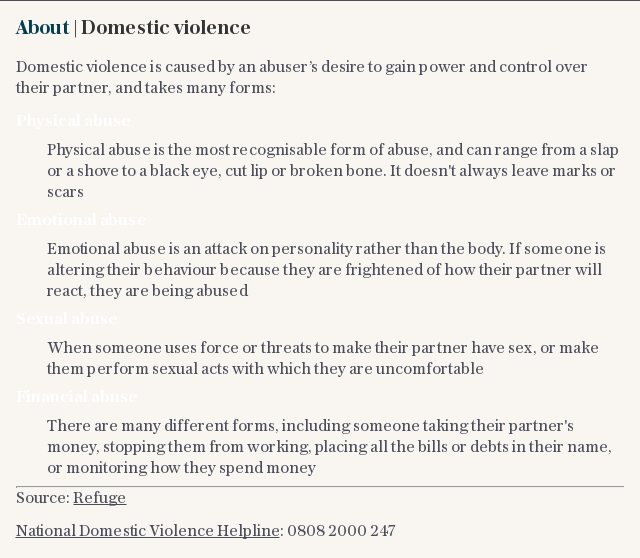New domestic abuse laws could underestimate violence against women, academic warns

New rules for recording domestic violence could lead to cuts for women's refuges as female victims are underestimated, a leading academic has warned.
Sylvia Walby, professor of sociology at Lancaster University and a UNESCO Chair in Gender Research said that the new offence of coercive control would mask the fact that women tend to be the victims of a higher number and a more serious level of offences.
"The offence of coercive control groups together a whole series of violent incidents and counts it as one. What we are arguing for is the importance of separately counting all of those violent incidents and not losing it in that merger into one.
"The way the offence has been set up is to merge all of those events together. We think that was a mistake. We all agree on the importance of the repetition and we disagree on how that is best handled in law," she told the Telegraph.
The paper, published in the journal Criminology & Criminal Justice, argues that multiple incidents as serious as grievous bodily harm would be lumped together under the umbrella of one offence.
"Only by taking account of the repetitive nature of domestic violence, is the full extent of the gendered asymmetry made visible.
"The proposed method to count coercive and controlling behaviour as non-injurious violent crime, capped at one, in the Home Office Counting Rules is likely to render violence against women significantly less visible in police recorded crime," it argues.
The authors examined data from the crime survey for England and Wales and found that over 80 per cent of those who suffered more than ten crimes were female, and less than five per cent of victims - all female - report 48 per cent of domestic violent crimes.
98 per cent of those who reported experiencing repeated domestic violent crime which left them with injuries were female.
Professor Walby concludes that "the concept of domestic violent crime is preferable to that of coercive control when seeking to explain variations in domestic violence".
She warned that the new rules could have implications for the funding of programmes specifically aimed at helping female victims
"It will reduce the amount of domestic violence crime and it will reduce the amount of violent crime against women," she said.
"It will have implications across the board for public policy."

The new figures also threaten to feed controversy over the extent to which men are victims of domestic violence.
Professor Walby said she believed the harm to female victims was "already underestimated".
But other groups have argued that facilities for men are under-resourced and male victims are less likely to come forward because of the stigma.
The offence of coercive control was introduced in 2015 and is designed to help those who experience "extreme psychological and emotional abuse".
It was brought in following concerns that existing offences of harassment and stalking were not effectively identifying and punishing perpetrators of repeated domestic abuse.
However, MPs and campaigners raised concerns about whether it is working properly after figures emerged late last year suggesting that just 4,246 cases had been recorded by the police out of a total of almost two million victims of domestic violence.
A freedom of investigation request made by the Bureau of Investigative Journalism found that 532 charges had been brought in 29 police forces.
A Home Office spokesman said: “Domestic abuse is a devastating crime that shatters the lives of victims and families. In 2015 coercive or controlling behaviour became a crime in its own right recognising that those who suffer psychological and emotional abuse are just as much victims as those who suffer physical violence.
"Since 2010 prosecutions for domestic abuse have increased by 26 per cent and convictions by 33 per cent — meaning that more perpetrators are being brought to justice.
“We will introduce a landmark Domestic Abuse Bill to protect and support victims, recognise the life-long impact domestic abuse has on children and make sure agencies effectively respond to domestic abuse

 Yahoo News
Yahoo News 
